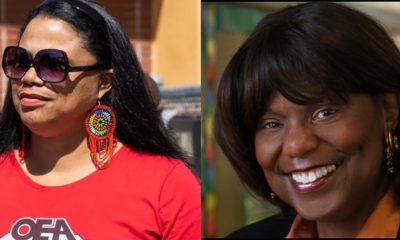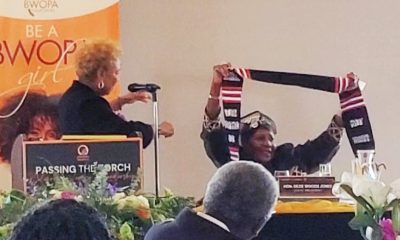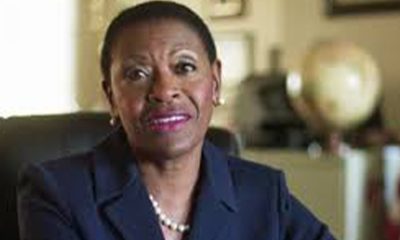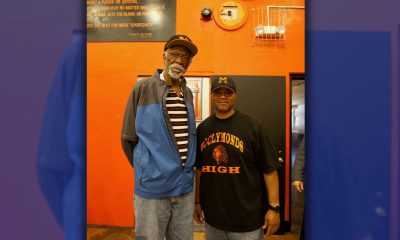Bay Area
Attorney Pamela Price Takes Lead in Alameda County DA Race
In school board races, progressive candidates opposed to closing neighborhood schools, Jennifer Brouhard in District 2, and Valarie Bachelor in District 6, are in front. If they maintain their leads, they will join Board members Mike Hutchinson and VanCedric Williams to form a majority on the seven-member board against closing schools and opposed to charter school expansion. (Because of redistricting, Hutchinson is running for a seat in District 4, but his current term as the District 5 representative doesn’t end for two more years.)

Progressives lead in City Council races, new progressive majority on school board
Gap narrows between Sheng Thao and leading Oakland mayoral candidate Loren Taylor
By Ken Epstein
(Editor’s note: This article reflects standings and vote totals as of press time, Wednesday afternoon, November 16th)
With thousands of ballots still to be counted, progressive candidate Pamela Price has taken the lead in the Alameda County District Attorney race, while likely winners of several Board of Education races are on the verge of forming a new progressive majority on the school board for the first time in decades.
“(Tuesday evening,) our campaign took the lead in the race for Alameda DA…There are still so many more ballots to be counted, and we must continue to wait for the victory,” Price wrote in an email to supporters.
“I remain confident that the final tally will be an exclamation point in history… it will be our charge to reclaim and fix our broken criminal justice system, restore public trust and rebuild public safety,” Price wrote.
In school board races, progressive candidates opposed to closing neighborhood schools, Jennifer Brouhard in District 2, and Valarie Bachelor in District 6, are in front. If they maintain their leads, they will join Board members Mike Hutchinson and VanCedric Williams to form a majority on the seven-member board against closing schools and opposed to charter school expansion. (Because of redistricting, Hutchinson is running for a seat in District 4, but his current term as the District 5 representative doesn’t end for two more years.)
“We ran a good campaign …It was about the issues and people placed their votes in wanting to see an end to school closures and funding our schools,” said Brouhard on Facebook. “I’m optimistic about the outcome of our people-powered campaign.”
In District 4, Nick Resnick, backed by Mayor Libby Schaaf and pro-charter leaders, remains in the lead.
Progressive and very liberal candidates are also far ahead in Oakland City Council races.
Council President Nikki Fortunato Bas is well ahead of her opponent in her race to win reelection in District 2, and Janani Ramachandran has already declared victory in District 4. District 6 candidate Kevin Jenkinshas a comfortable lead over three opponents.
Still undecided is the race to replace Libby Schaaf as mayor of Oakland. Councilmember Loren Taylor holds the lead over Councilmember Sheng Thao, but the gap is narrowing this week with updated vote counts, released at 5:00 p.m. each day by the Alameda County Registrar of Voters.
Only 1.78% separated Taylor and Thao on Wednesday.
According to reports, at the beginning of this week, there were over 70,000 votes remaining to be counted. About 13,000 were counted today, leaving about 42,000 still uncounted.
Observers notice that in recent elections the ballots of progressive and very liberal voters in Oakland are counted later, meaning that their influence is not fully felt until the final days of tallying the vote.
Vote totals as of Wednesday afternoon:
Alameda County District Attorney
- Pamela Price 51.08%
- Terry Wiley 48.95%
Alameda County Board of Supervisors District 3
- Lena Tam 06%
- Rebecca Kaplan 46.94%
Mayor of Oakland (with Ranked Choice ballots)
- Loren Taylor 50.89%
- Sheng Thao 49.11%
Oakland City Council District 2
- Nikki Fortunato Bas 97%
- Harold Lowe 34.03%
Oakland City Council District 4
- Janani Ramachandran 67.71%
- Nenna Joiner 32.29%
Oakland City Council District 6
- Kevin Jenkins 69.86%
- Yakpasua Michael Gbagba Zazaboi 11.51%
- Nancy Sidebotham 11.36%
- Kenny Session 7.28%
Board of Education District 2 (with Ranked Choice ballots)
- Jennifer Brouhard 62.66%
- David Kakishiba 37.34%
Board of Education District 4
- Nick Resnick 39%
- Mike Hutchinson 31.29%
- Pecolia Manigo 29.71%
Board of Education District 6 (with Ranked Choice ballots)
- Valarie Bachelor 53.25%
- Kyra Mungia 46.75%
Activism
OP-ED: AB 1349 Puts Corporate Power Over Community
Since Ticketmaster and Live Nation merged in 2010, ticket prices have jumped more than 150 percent. Activities that once fit a family’s budget now take significant disposable income that most working families simply don’t have. The problem is compounded by a system that has tilted access toward the wealthy and white-collar workers. If you have a fancy credit card, you get “presale access,” and if you work in an office instead of a warehouse, you might be able to wait in an online queue to buy a ticket. Access now means privilege.

By Bishop Joseph Simmons, Senior Pastor, Greater St. Paul Baptist Church, Oakland
As a pastor, I believe in the power that a sense of community can have on improving people’s lives. Live events are one of the few places where people from different backgrounds and ages can share the same space and experience – where construction workers sit next to lawyers at a concert, and teenagers enjoy a basketball game with their grandparents. Yet, over the past decade, I’ve witnessed these experiences – the concerts, games, and cultural events where we gather – become increasingly unaffordable, and it is a shame.
These moments of connection matter as they form part of the fabric that holds communities together. But that fabric is fraying because of Ticketmaster/Live Nation’s unchecked control over access to live events. Unfortunately, AB 1349 would only further entrench their corporate power over our spaces.
Since Ticketmaster and Live Nation merged in 2010, ticket prices have jumped more than 150 percent. Activities that once fit a family’s budget now take significant disposable income that most working families simply don’t have. The problem is compounded by a system that has tilted access toward the wealthy and white-collar workers. If you have a fancy credit card, you get “presale access,” and if you work in an office instead of a warehouse, you might be able to wait in an online queue to buy a ticket. Access now means privilege.
Power over live events is concentrated in a single corporate entity, and this regime operates without transparency or accountability – much like a dictator. Ticketmaster controls 80 percent of first-sale tickets and nearly a third of resale tickets, but they still want more. More power, more control for Ticketmaster means higher prices and less access for consumers. It’s the agenda they are pushing nationally, with the help of former Trump political operatives, who are quietly trying to undo the antitrust lawsuit launched against Ticketmaster/Live Nation under President Biden’s DOJ.
That’s why I’m deeply concerned about AB 1349 in its current form. Rather than reining in Ticketmaster’s power, the bill risks strengthening it, aligning with Trump. AB 1349 gives Ticketmaster the ability to control a consumer’s ticket forever by granting Ticketmaster’s regime new powers in state law to prevent consumers from reselling or giving away their tickets. It also creates new pathways for Ticketmaster to discriminate and retaliate against consumers who choose to shop around for the best service and fees on resale platforms that aren’t yet controlled by Ticketmaster. These provisions are anti-consumer and anti-democratic.
California has an opportunity to stand with consumers, to demand transparency, and to restore genuine competition in this industry. But that requires legislation developed with input from the community and faith leaders, not proposals backed by the very company causing the harm.
Will our laws reflect fairness, inclusion, and accountability? Or will we let corporate interests tighten their grip on spaces that should belong to everyone? I, for one, support the former and encourage the California Legislature to reject AB 1349 outright or amend it to remove any provisions that expand Ticketmaster’s control. I also urge community members to contact their representatives and advocate for accessible, inclusive live events for all Californians. Let’s work together to ensure these gathering spaces remain open and welcoming to everyone, regardless of income or background.
Activism
Oakland Post: Week of December 31, 2025 – January 6, 2026
The printed Weekly Edition of the Oakland Post: Week of – December 31, 2025 – January 6, 2026

To enlarge your view of this issue, use the slider, magnifying glass icon or full page icon in the lower right corner of the browser window.
Activism
Big God Ministry Gives Away Toys in Marin City
Pastor Hall also gave a message of encouragement to the crowd, thanking Jesus for the “best year of their lives.” He asked each of the children what they wanted to be when they grow up.

By Godfrey Lee
Big God Ministries, pastored by David Hall, gave toys to the children in Marin City on Monday, Dec. 15, on the lawn near the corner of Drake Avenue and Donahue Street.
Pastor Hall also gave a message of encouragement to the crowd, thanking Jesus for the “best year of their lives.” He asked each of the children what they wanted to be when they grew up.
Around 75 parents and children were there to receive the presents, which consisted mainly of Gideon Bibles, Cat in the Hat pillows, Barbie dolls, Tonka trucks, and Lego building sets.
A half dozen volunteers from the Big God Ministry, including Donnie Roary, helped to set up the tables for the toy giveaway. The worship music was sung by Ruby Friedman, Keri Carpenter, and Jake Monaghan, who also played the accordion.
Big God Ministries meets on Sundays at 10 a.m. at the Mill Valley Community Center, 180 Camino Alto, Mill Valley, CA Their phone number is (415) 797-2567.
-

 Activism4 weeks ago
Activism4 weeks agoDesmond Gumbs — Visionary Founder, Mentor, and Builder of Opportunity
-

 Activism4 weeks ago
Activism4 weeks agoFamilies Across the U.S. Are Facing an ‘Affordability Crisis,’ Says United Way Bay Area
-

 Alameda County4 weeks ago
Alameda County4 weeks agoOakland Council Expands Citywide Security Cameras Despite Major Opposition
-

 Alameda County4 weeks ago
Alameda County4 weeks agoBling It On: Holiday Lights Brighten Dark Nights All Around the Bay
-

 Activism4 weeks ago
Activism4 weeks agoBlack Arts Movement Business District Named New Cultural District in California
-

 Activism4 weeks ago
Activism4 weeks agoLu Lu’s House is Not Just Toying Around with the Community
-

 Activism4 weeks ago
Activism4 weeks agoOakland Post: Week of December 17 – 23, 2025
-

 Black History3 weeks ago
Black History3 weeks agoAlfred Cralle: Inventor of the Ice Cream Scoop



















































